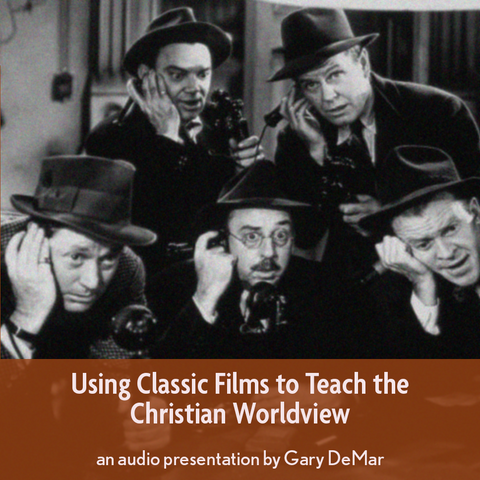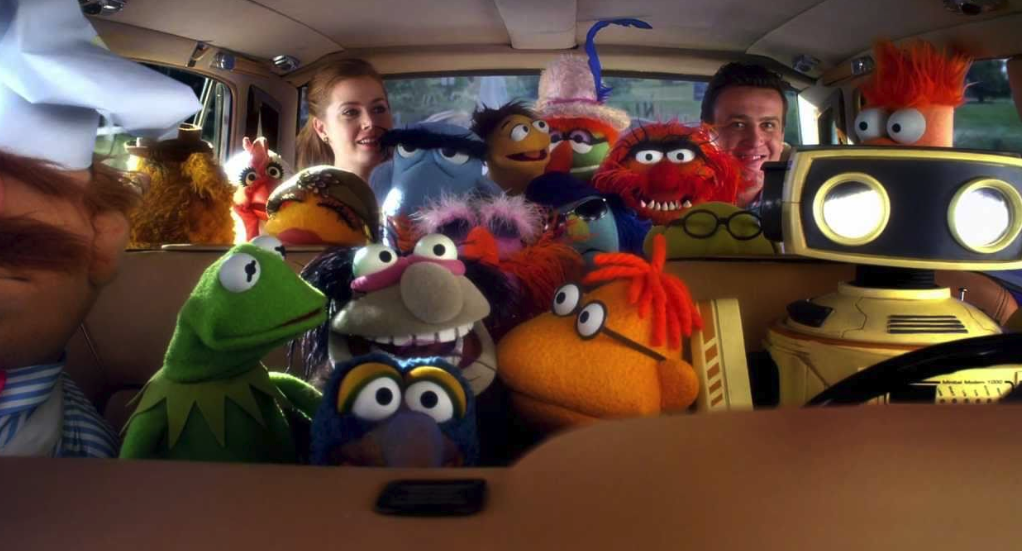Important Note: Gary DeMar’s Facebook page has been taken down. To keep up with the latest from Gary and American Vision or to continue the conversation from articles, podcasts, or videos, please go to the AV Facebook page here.
American Vision used to have a monthly magazine called “Biblical Worldview.” Some of you may remember it. It was filled with articles, book reviews, product highlights, and much more. It was a major production for our small staff and made the months fly by. Once the new issue was off to the printers, it was time to start on the next one. It sometimes felt like Groundhog Day but it was a lot of fun, too. I (Eric) used to do movie reviews and I recently came across my review below of the 2011 movie, “The Muppets.” It seemed fitting for our modern day, despite the movie (and review) being 14 years old. Listeners of The Gary DeMar Podcast will recognize the analogy of Chesterton’s “old white post,” which is always appropriate to remind us of how the past influences the present. Or at least, how it should…
Last night I took my children to see The Muppets. It was my son’s birthday and he requested to see a movie “in the theater.” The cost of “in the theater” movies being what it is, this is a rare occasion for us. Wanting to make the most of the big screen, I suggested we see The Muppets, rather than the animated feature they had in mind. They begrudgingly consented, knowing all too well that the guy with the wallet ultimately wins out anyway.
We arrived to a half-full theater (at best), nearly all of them families with young children. Apparently everyone else had the same notion as I did: the Muppet franchise is a fairly safe bet for “family-friendly” entertainment. And on this point The Muppets did not disappoint. No innuendo, no double entendres, no questionable humor hidden behind a childish veneer. Although much of the humor is dependent upon a familiarity with pop culture (which is typical for any of the Muppet films), it never ventures into PG-13 territory by trying to sneak in covert bathroom humor. Other than Fozzie’s “fart-shoes,” the material stays comfortably in the kid-friendly zone.
However, as true as it tries to keep with the long Muppet tradition, The Muppets utterly fails because of this allegiance. This is not to say that it is a bad film, in fact it is a very good film, one that I can recommend to viewers wholeheartedly without any reservation. The reason that The Muppets fails is not because it does not tell a great story (even though its message has been done to death ad infinitum); it fails because it doesn’t communicate with its younger audience. As much as it tries to appeal to a whole new generation of potential Muppet enthusiasts, all it really does is give the parents something to reminisce about. Young viewers—who have never seen an episode of The Muppet Show or even the original Muppet Movie—are completely left out of 80% of the humor. And since they’re not in on the joke, most of the kids in the theater lost interest in the movie. Trying to stay true to a 30-year-old formula, The Muppets failed to connect with anyone under 30.

Thinking Straight in a Crooked World
The nursery rhyme "There Was a Crooked Man" is an appropriate description of how sin affects us and our world. We live in a crooked world of ideas evaluated by crooked people. Left to our crooked nature, we can never fully understand what God has planned for us and His world. God has not left us without a corrective solution. He has given us a reliable reference point in the Bible so we can identify the crookedness and straighten it.
Buy NowThis same failure is on display for anyone willing to look at the modern conservative movement. Similar to The Muppets, conservatives often rely on decades-old arguments to make their case that their political view is the correct one. This does not mean that decades-old arguments are untrue, but it does mean that the intended modern audience does not understand them. Noted 19th and early 20th century author and journalist G. K. Chesterton makes an interesting point that speaks to this very issue:
All conservatism is based upon the idea that if you leave things alone you leave them as they are. But you do not. If you leave a thing alone you leave it to a torrent of change. If you leave a white post alone it will soon be a black post. If you particularly want it to be white you must be always painting it again; that is, you must be always having a revolution. Briefly, if you want the old white post you must have a new white post. (Orthodoxy, 1908)
Chesterton points out that conservatives are generally known for their adherence to “tradition”—to the way things “used to be.” While this is true to a point, real conservatives must be aware of not only what they believe, but why they believe it as well. Spend any amount of time with a modern conservative and you are sure to hear something about “the good old days” or “back then.” But just like Chesterton’s “white post,” the conservative ideal from yesteryear is seldom, in reality, the way things actually were. Would we really exchange all of our modern conveniences and technologies for a house with a white-picket fence where we never have to lock the doors? Probably not. We long for the “good old days” only when we become frustrated with our “dreadful new days.” P. J. O’Rourke puts it succinctly: “When you think about the good old days, think dentistry.”
It must be pointed out, though, that Chesterton was actually arguing against conservatism and for progressivism. He believed that “all” conservatism is based on the idea of leaving things as we found them. Sadly, many modern conservatives share this conviction, despite the fact that it is a complete misrepresentation of true conservatism. A true conservative is one who does indeed realize that a white post needs ongoing coats of paint in order to stay white. A true conservative is one who does not retreat from the challenge of new ideas, but meets them head-on. A true conservative is one who recognizes that the old way of doing things was good, but that there is also a new way of doing the old things. A true conservative admits that a tractor is better than a plow, a car is better than a buggy, and an oven is better than an open fire. New ways bring new methods, but a true conservative is one that understands that we should not be primarily concerned with the method, but with the need.
What Chesterton’s story about the white post fails to mention is why the post was needed in the first place. If it is simply a remnant from an old fence, painting it white adds nothing to it; the paint is doing little more than preserving a distant memory. But if it is a marker for a property line, it is a very important and necessary post and keeping it white and clean is an important function. You see we must first learn to ask “why,” before we can attempt to answer “how.” Far too many Americans are concerned with and arguing over the color of the post, rather than first seeking to understand the purpose of the post.
In other words, conservatives need to be finished with weepy sentimentalism about the past and come to terms with the reality of the present day. Conservatives know and agree with liberals that poverty, education, healthcare, race relations, foreign policy, taxes, and many other social and economic issues are in desperate need of being addressed in a tangible, factual, and practical way. Despite rhetoric from the media and the halls of Congress, conservatives are not looking to throw old people out on the streets, starve the poor, deprive children of education, or war-monger the entire planet into colonial submission. Conservatives are just as concerned about the issues, the problem is that they are always on their heels because they allow the media to frame the debate.

Using Classic Films to Teach the Christian Worldview
Movies are a self-contained world. The writers and producers make the rules and the circumstances for the worlds they create. Most often though, films use the assumed order of the natural world and don't attempt to re-write reality for the viewer. Films either reinforce the real world or they rebel against it. Either way, they provide a great way to think through worldview issues and their consequences. In this talk, Gary DeMar makes the point that classic movies are excellent teaching tools for a Christian worldview—for children and adults.
Buy NowLike the producers of The Muppets, modern conservatives must seek new ways to explain why their “old” values are superior. Nostalgia is no way to make a compelling movie, nor is it any way to move a country forward. As much as we may appreciate the stories of the America of days gone by, this is not where we live. The America of late 2011 has unique and complicated issues that it must contend with, and the foundational values of the America of 1940 are still the best solution. More public money, more bureaucracy, or more governmental oversight (or as is most often the case, all three) should never be the conservative answer, but simply stating it does nothing to solve the present problem. Conservatives are usually too busy discussing long-term ideals, when they should be thinking about short-term answers. This isn’t a compromise; it is a reality. Long-term solutions can only begin to become a reality with short-term goals.
If conservatives want to influence the next generation of voters and workers, they must learn a communication lesson from The Muppets. In order to reach the youth, you have to speak in terms they can understand. My kids don’t understand allusions to 30-year-old TV programs, just as most teenagers and young adults don’t understand why conservatives are always talking about the past. They are (as should we all be) more concerned about the future and what is coming, not with what has already been. Until conservatives actually take hold of this reality and begin to do something about it, they will only be talking to themselves.

